Key takeaways:
- Journaling serves as a powerful tool for self-discovery and emotional expression, allowing individuals to untangle complex feelings and gain clarity.
- Effective journaling techniques, such as free writing, using prompts, and reflective reading, enhance emotional processing and self-awareness.
- Incorporating journaling into daily life can be achieved through intentional routines, such as setting specific times or themes for entries, making it a meaningful habit.
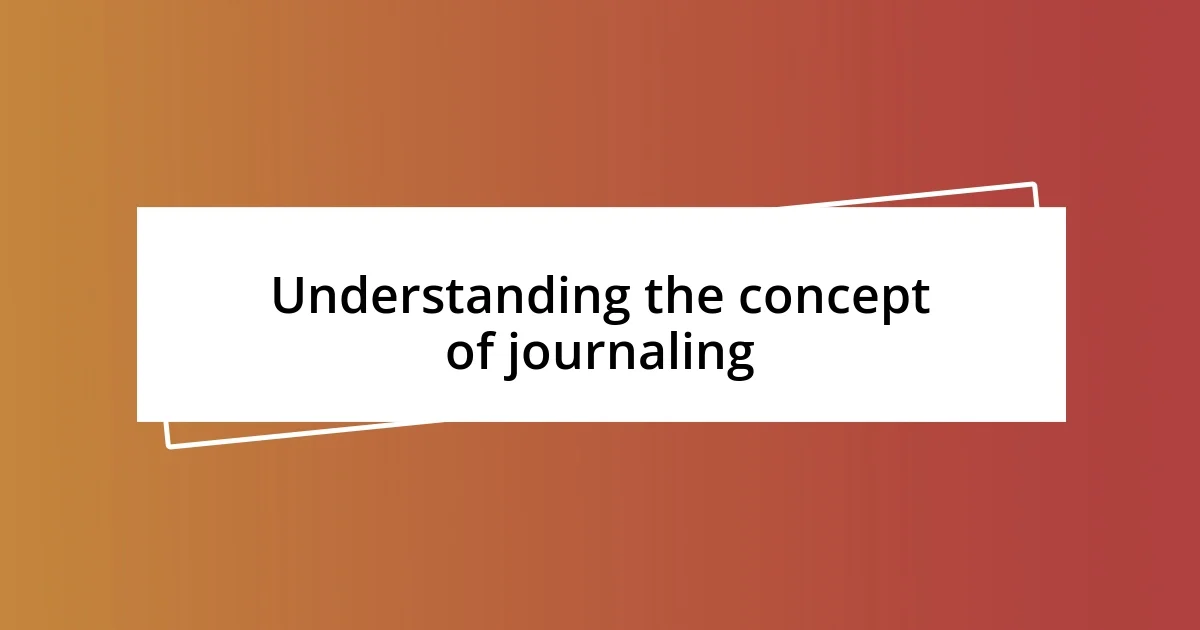
Understanding the concept of journaling
Journaling is an intimate act that invites us to spill our thoughts onto the page, allowing for clarity and self-exploration. I remember the first time I took a pen to paper, feeling a mix of anxiety and relief as I let my inner voice flow without judgment. What surprised me most was how this simple practice became a confidante, helping me untangle emotions I didn’t even know I had.
Many people think of journaling as a mere recording of daily events, but it’s so much deeper than that. For me, it became a safe space to navigate my feelings—joy, sadness, frustration. Engaging in this practice often made me wonder: what if our emotions had a voice? Journaling offered me that voice, enabling me to understand why I felt the way I did and guiding me toward meaningful change.
When I reflect on my journaling journey, I realize it’s not just about documenting life; it’s about understanding its impact on our psyche. Each entry became a stepping stone on my path to self-awareness, reminding me that exploring my emotions is not only okay but necessary. Can you think of a time you needed to sort through a jumbled mess of feelings? Journaling can be that powerful tool for many of us, transforming confusion into insight.
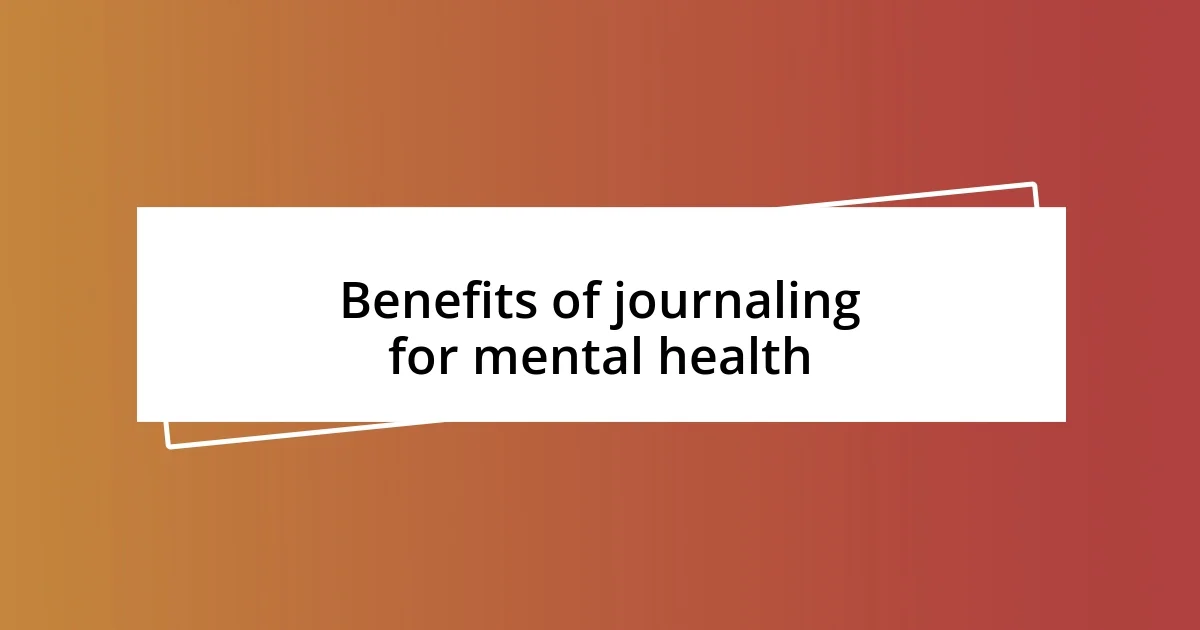
Benefits of journaling for mental health
Journaling offers a myriad of benefits for mental health, acting as a powerful tool for self-discovery and emotional release. From my personal experience, I found that when I poured my feelings onto the page, it felt like lifting a weight off my shoulders. It’s not just about writing—it’s about creating a dialogue with oneself, fostering a deeper understanding of our emotional landscapes.
The benefits of journaling for mental health include:
- Emotional Clarity: Writing helps sort through complex emotions, providing insights and revelations.
- Stress Relief: Expressing thoughts on paper can diminish anxiety and foster a sense of calm.
- Enhanced Self-Awareness: Regular journaling enables us to track patterns in our feelings and reactions over time.
- Improved Mood: Documenting positive moments boosts overall happiness and encourages gratitude.
- Skill Building: It cultivates skills such as patience and discipline as we commit to the process.
I remember days when I felt overwhelmed; journaling was my safe haven. It was like having a trusted friend who patiently listened to my worries. Looking back, those moments became not only cathartic but also enlightening, often revealing patterns or solutions I hadn’t noticed before.

Techniques for effective emotional journaling
Techniques for effective emotional journaling can make a world of difference in how we process our feelings. One technique that I’ve found invaluable is the practice of free writing. This involves setting a timer for ten minutes and writing whatever comes to mind without worrying about grammar or structure. I remember a night when I let my pen run wild across the page; I was amazed at how my thoughts transformed into a raw, unfiltered expression of my emotions. It felt liberating and uplifting, almost like purging my mind of clutter!
Another technique is using prompts to guide your writing. Prompts can be questions like, “What am I feeling right now?” or “What do I wish I could say to someone?” These prompts help you dive deeper into your emotions. I recall using a prompt during a particularly tough phase. It prompted me to explore not just the surface anger or sadness, but also the underlying fears that were causing them. That experience was eye-opening and allowed me to understand myself on a much deeper level.
Lastly, incorporating a reflective element in your journaling practice can be beneficial. After writing, take a moment to read what you’ve written and reflect on it. I often find that the insights I gain from this reflection can lead to powerful realizations about my feelings and behavior. For instance, I once noticed that I consistently wrote about feeling overwhelmed during certain times of the month, which helped me develop coping strategies for those periods. Emotional journaling isn’t just about writing; it’s about engaging with your emotions, and these techniques can truly enhance that journey.
| Technique | Description |
|---|---|
| Free Writing | Unstructured writing for a set timeframe, focusing solely on pouring out thoughts and feelings. |
| Using Prompts | Guided questions to explore emotions and thoughts more deeply. |
| Reflective Reading | Reviewing what you’ve written to gain insights and identify patterns in your emotional landscape. |
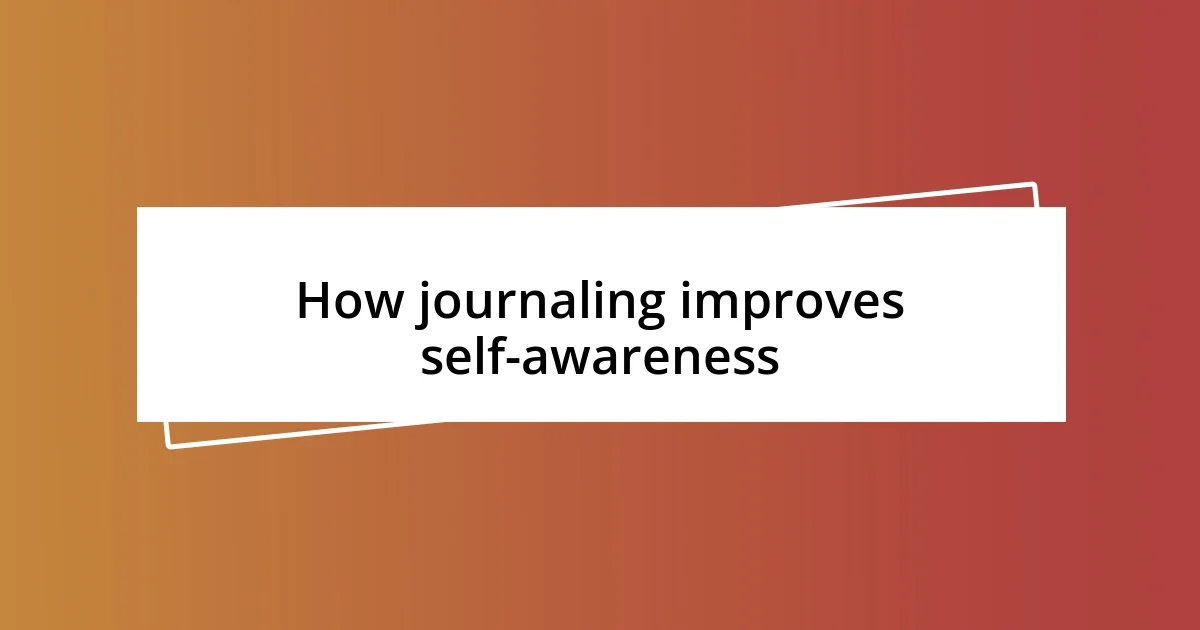
How journaling improves self-awareness
I’ve found that journaling can be a transformative experience in fostering self-awareness. When I write about my day, I often note my reactions to certain events—this helps me understand my emotional triggers. For example, I once realized that a simple comment from a friend elicited a much stronger emotional response than I expected. Reflecting on that entry led me to uncover some deeper insecurities I hadn’t acknowledged before.
Tracking my feelings over time is another valuable aspect of journaling. I’ve kept a mood tracker alongside my journaling, and reviewing those entries has shown me powerful patterns in my emotional states. For instance, I noticed that during particularly busy weeks, my anxiety levels soared, while writing about my weekends highlighted moments of joy and contentment. It was a stark contrast that helped me identify when I need to carve out more time for self-care.
Have you ever found yourself unaware of how a situation truly affects you? I certainly have. Through regular reflection, I’ve become more adept at recognizing these hidden feelings. One time, I wrote pages about feeling disconnected from a family member, and that introspection helped me take a step forward to mend our relationship. Journaling taught me that self-awareness isn’t just about acknowledging our emotions—it’s also about using that awareness to create positive change in our lives.
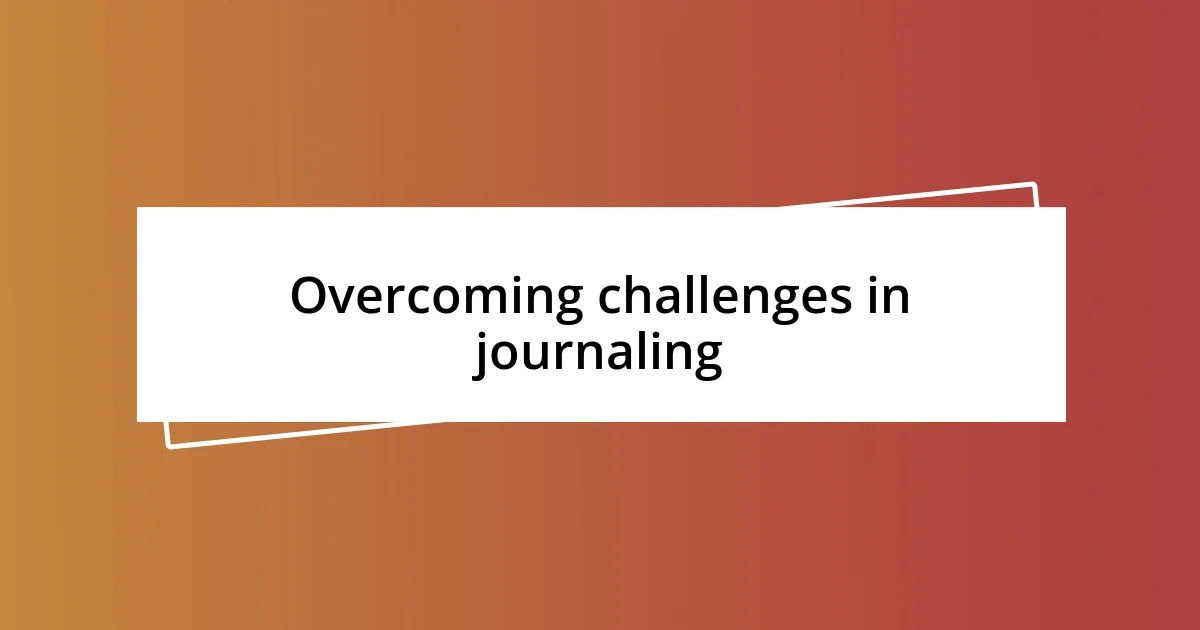
Overcoming challenges in journaling
One challenge many face is the fear of judgment, even when journaling is a private activity. I remember a time when I hesitated to write about my feelings, worried that my raw emotions would seem too dramatic or vulnerable. But once I let go of that fear, I found freedom in expressing my truest self. It taught me that my emotions are valid, and journaling is a safe space for them.
Another obstacle is dealing with writer’s block, which can be really frustrating. I’ve experienced days when I’d sit in silence, staring at an empty page, feeling stuck. What helped me was shifting my focus to shorter entries or even doodling before writing. Those tiny sparks of creativity often led me to deeper thoughts and feelings I didn’t expect to uncover. It’s remarkable how a little change in approach can reignite the flow of ideas.
Consistency is key, but it can also be tough to maintain. I once struggled to keep up my journaling habit, especially during hectic times. What I found effective was setting aside just a few minutes each day, rather than aiming for lengthy sessions. This small commitment transformed my journaling practice into a manageable and meaningful part of my daily routine, allowing me to explore my feelings without any pressure. Have you found simple methods that work for you during challenging times?
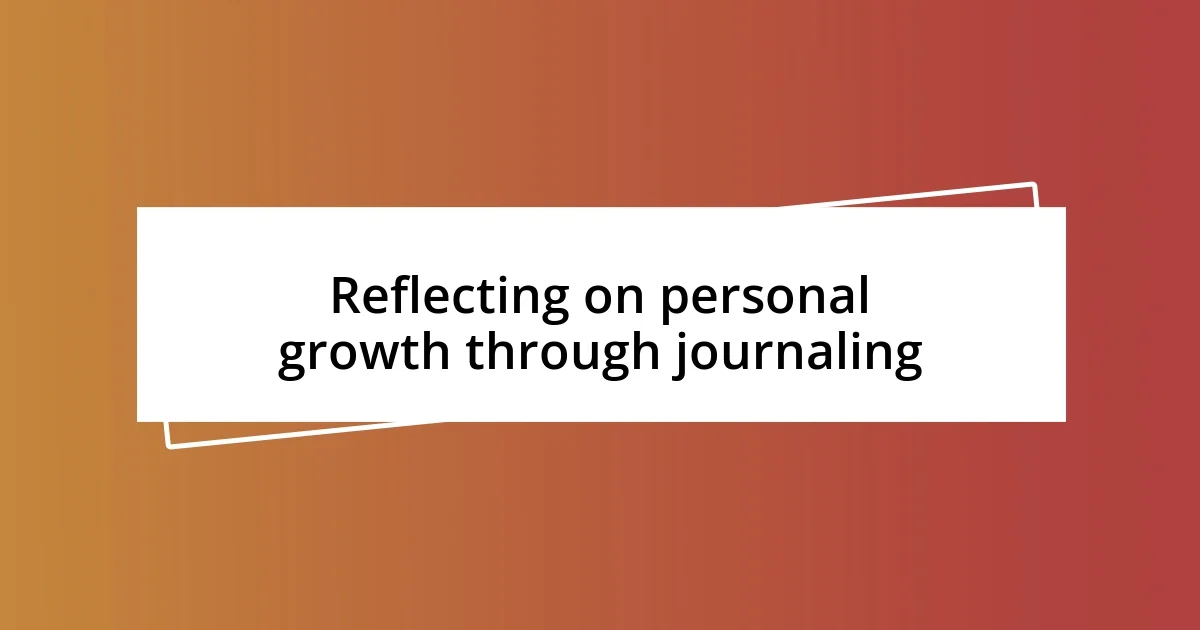
Reflecting on personal growth through journaling
Reflecting on my personal growth through journaling has been a revelation. I distinctly remember the time I revisited my earlier entries. It was eye-opening to see how often I felt overwhelmed, and yet, as I read through my writing, I noticed a gradual shift in my mindset. This growth wasn’t just evident in my language; it was as if I could see my journey from confusion to clarity laid out before me, showcasing the power of consistent reflection.
One of the most profound changes I’ve experienced is learning to embrace vulnerability. In the beginning, I often held back, worried that I might sound too emotional or self-indulgent. But a memorable moment came when I decided to write about a particularly challenging breakup. As I penned down my thoughts, I realized that exposing my heart was a form of strength, not weakness. Those pages became a kind of catharsis, allowing me to process my feelings and move forward with greater resilience.
Have you ever felt stagnant in life, longing for change but unsure where to start? Journaling guided me through that murky water. I vividly recall a time when I felt stuck in my career, and writing about my aspirations helped illuminate the paths I hadn’t considered. It was as if journaling became a compass, pointing me in the right direction. Through regular writing, I’ve learned that personal growth isn’t just a destination; it’s an ongoing journey, one that I continue to map out with each entry.

Incorporating journaling into daily life
Incorporating journaling into daily life requires a bit of intentionality, but once you find your rhythm, it’s transformative. I decided to keep a small notebook in my bag, making it easy to jot down my thoughts during quiet moments, like while waiting for a friend or on my lunch break. Sometimes, just a few lines capturing how I felt at that moment brought a sense of clarity I hadn’t expected.
I also found that setting a specific time for journaling helped me stay committed. Mornings became my golden hour, a chance to gather my thoughts before the day unfolded. I’d sit with my coffee, allowing the quiet to encourage my ideas to flow. Have you ever noticed how morning reflections can shape your outlook? For me, it felt like a gentle reminder of what mattered, grounding me amidst life’s chaos.
Another enjoyable strategy I’ve adopted is themed journaling days. For instance, I might dedicate Wednesdays to gratitude, where I list down three things I appreciate that week. This fun twist turned journaling into something I looked forward to rather than a chore. It also sparks joy and reminds me of the little things often overshadowed by daily stress. Can you think of specific themes that resonate with you?














